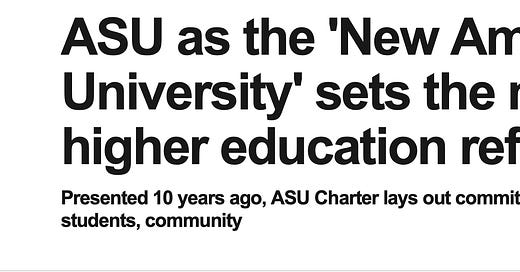Is ASU a model for reform?
ASU News recently celebrated the 10-year anniversary of the ASU charter, which outlines the values of what is termed the New American University: access, impact, and excellence. With these values, ASU has grown to serve 180,000 students this year. However, does this represent a true reform in state university education, creating a genuinely new university? No—and here’s why.
Reform involves returning to original values that were once neglected or forgotten. However, Arizona’s state universities, including ASU, were always intended to provide access to Arizona college-age students who met the minimum requirements. Arizona State University never defined itself by exclusivity; it has always been a large, inclusive institution, reflecting a "big umbrella" approach. This characteristic is not unique to ASU.
In comparing ASU with UCLA, one might argue that ASU has historically been more accessible than the University of California schools. But what about excellence? Has ASU now caught up to UCLA’s level of excellence? Not quite. Excellence isn’t a mysterious, unattainable quality. In universities, just as in business, excellence primarily depends on salaries and financial resources.
If you offer the salaries that "excellent" professors demand and build the state-of-the-art research facilities they seek, you’ll attract those "excellent" professors. It’s really that straightforward. While some might prefer the amenities of Wilshire Boulevard over Mill Avenue, there are plenty who favor the desert environment over the congestion of Los Angeles.
Maybe the reform comes in the area of impact? Here, you might have an argument—a radical leftist argument. What kind of impact is ASU trying to have? They still list a required DEI course for their employees. They now require all students to take a sustainability course that teaches about Marxist “social justice” and tells the students to shop at Starbucks.
Maybe then we humanists can return to teaching about wisdom and the meaning of life.
ASU can point to successful innovations (it is #1, after all) that do indeed help the community. But much of this is overshadowed by its poisoned humanities programs and social justice campaigns.
At ASU, "impact" is measured through a pragmatist lens. The American university is expected to address practical issues facing not just Americans but the global community, as ASU identifies itself as a globalist institution. This is evident, for example, in the actions of some faculty senators who worked to circumvent federal laws regarding students without legal immigration status. But which problems are being addressed, and how are they being solved?
Imagine you eliminate carbon emissions entirely, distribute wealth equally, compensate non-white individuals with additional resources, achieve perfect universal healthcare, and extend human life to 150 years. Even if you convince confused students to chop off body parts and take castration medication to resolve their inner conflicts, have you truly solved humanity's problems? No, because there's a crucial issue that remains overlooked. To understand this, you should revisit the classics. Perhaps begin with Aldous Huxley’s Brave New World and Viktor Frankl’s Man’s Search for Meaning (yes, I read beyond the Greeks and Romans).
You have failed to teach wisdom. While your students and community may have perfect material lives, they are left feeling empty and without purpose. They do not understand the reason for living. In the past, classes known as "the humanities" were dedicated to addressing this very issue. However, in the New American University, such classes have shifted their focus to topics like gender dysphoria, cultural appropriation, the evils of whiteness and heteronormativity, and the benefits of polyamory.
These professors tell students that the best life is one that “Leave the place better than you found it, that helps other people have a good life,” but “better” and “good” mean more of the above—more polyamory and hatred of whiteness etc etc.
Based on my posts about ASU’s humanities classes and events, is there any indication that ASU is genuinely reforming American higher education or that the New American University represents a positive, meaningful version of "new"? On the other hand, if Trump succeeds in holding universities accountable for their use of student loan money and requires them to cease promoting "Marxism, mania, and lunacy," that would constitute a true reform.
Maybe then we humanists can return to teaching about wisdom and the meaning of life.




